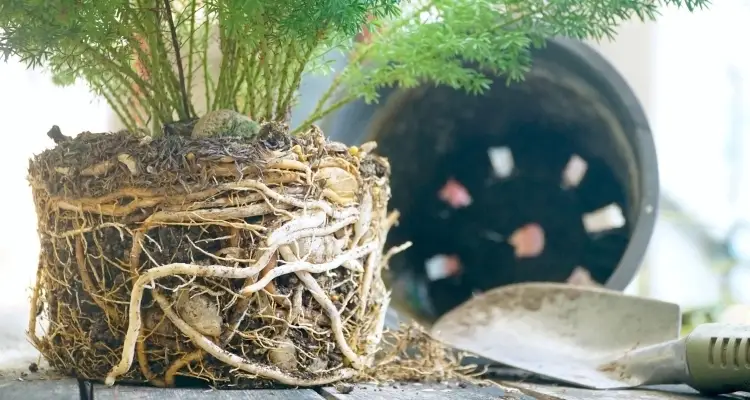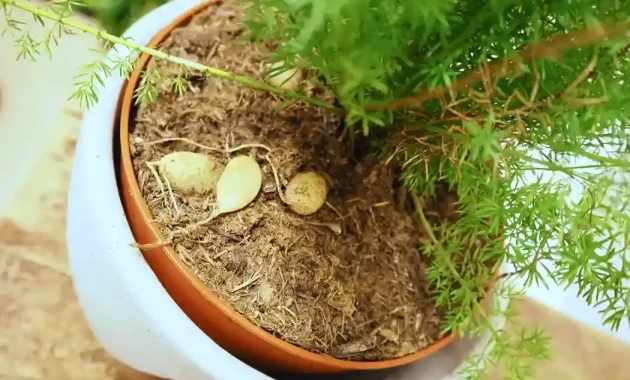Asparagus ferns are a stunning addition to any indoor or outdoor space. To ensure your ferns flourish and produce vibrant foliage, it’s essential to use the best soil for asparagus ferns.
In this section, we will explore the particular soil requirements that asparagus ferns have and help you choose the right soil mix for optimal growth. Let’s get started!
Key Takeaways:
- The best soil for asparagus ferns promotes optimal growth and vibrant foliage.
- Asparagus ferns have specific soil requirements, including essential nutrients, good drainage, and aeration.
- Choosing the right soil mix for asparagus ferns is crucial to ensuring that they thrive.
Understanding Asparagus Fern Soil Requirements
Asparagus ferns have specific soil requirements to thrive and develop lush foliage. Understanding the ideal soil composition is crucial for their successful growth. The growing medium should provide essential nutrients, good drainage, and aeration for healthy root development.
The ideal soil for asparagus ferns is a well-draining, nutrient-rich mix that is slightly acidic to neutral in pH. The soil should be loose and airy, allowing roots to spread and water to drain easily. It should also retain enough moisture to prevent the soil from drying out completely.
Asparagus ferns grow well in a variety of soil types, including loam, sandy loam, and peat-based mixes. Loam soil is a good choice because it combines sand, silt, and clay particles to create a balance of drainage, aeration, and water retention. Sandy loam is ideal for drainage and aeration, while peat-based soil mixes are nutrient-rich and retain moisture well.
Important Considerations for Choosing Asparagus Fern Soil
When selecting soil for asparagus ferns, it is essential to consider the following factors:
- Drainage: Asparagus ferns need well-draining soil to prevent root rot and other fungal diseases.
- Nutrients: The soil should be rich in essential nutrients, including nitrogen, phosphorus, and potassium, to promote healthy growth.
- Aeration: Proper aeration is crucial for root development and overall plant health.
- pH level: Asparagus ferns prefer soil with a pH between 5.5 and 7.0.
- Moisture retention: The soil should retain enough moisture to prevent it from drying out completely, but not so much that it becomes waterlogged.
Overall, choosing the right soil mix for asparagus ferns is essential to ensure their optimal growth and vitality. By understanding their specific soil requirements, you can create an environment that promotes healthy root development and vibrant foliage.

Recommended Soil for Asparagus Ferns
When it comes to selecting the ideal soil for asparagus ferns, there are a few key options to consider. Here are some of the top soil choices recommended by expert gardeners:
| Soil Type | Composition | Suitability |
|---|---|---|
| Loam | A mixture of sand, silt, and clay that provides excellent drainage and nutrition retention. | Ideal for asparagus ferns, as it promotes healthy root development and supports lush foliage growth. |
| Sandy loam | A combination of sand, silt, and clay that drains quickly and has a slightly acidic pH level. | Suitable for asparagus ferns, as long as it is regularly enriched with organic matter to maintain fertility. |
| Peat-based mixes | A soil mix that contains peat moss and other organic matter such as perlite or vermiculite. | Ideal for asparagus ferns, as it provides excellent water retention and promotes healthy root growth. |
It’s vital to choose a soil type that provides adequate drainage, as overly wet soil can cause root rot and damage to the ferns. Organic matter, such as compost or well-rotted manure, can be added to improve soil fertility and promote healthy growth.
When choosing the best soil for your asparagus ferns, consider the current soil conditions in your garden or container. Select a soil type that complements your existing soil composition and provides the necessary nutrients and moisture retention for your ferns to thrive.
Key Tips for Choosing Asparagus Fern Soil:
Choosing the right soil for asparagus ferns might seem daunting, but by considering a few important factors, you can ensure optimal growth and vibrant foliage. Here are some key tips to keep in mind when selecting the best soil for your ferns:
- Well-draining soil: Asparagus ferns require soil that drains well and does not become waterlogged. Look for a potting mix that has a good balance of organic matter and perlite or sand to promote proper drainage.
- Potting mix designed for ferns: Using a potting mix specifically designed for ferns can provide the essential nutrients and pH balance that these plants need for healthy growth.
- Moisture retention: Asparagus ferns prefer soil that retains moisture to a certain extent. Look for soil mixes that include organic matter such as peat moss or compost to help retain moisture in the soil.
By keeping these key factors in mind, you can select the best soil for your asparagus ferns and create the ideal environment for them to thrive.
Preparing the Soil for Planting Asparagus Ferns
Before planting your asparagus ferns, it’s essential to prepare the soil properly. Proper soil preparation can help create an optimal environment for your ferns to thrive. Here are some key tips to get your soil ready for planting:
Soil Sterilization
Start by sterilizing the soil to prevent the growth of harmful pathogens. You can use a mixture of equal parts water and rubbing alcohol to disinfect your soil. Mix the solution thoroughly and spray it over the soil until it’s moist. Leave the soil to dry completely before planting your ferns.
Add Organic Matter
Add organic matter to the soil to enhance its fertility and improve drainage. Composted manure, leaf mold, and peat moss can all add essential nutrients to the soil. Mix the organic matter into the soil thoroughly before planting your ferns.
Improve Soil Drainage
The ideal soil for asparagus ferns is well-draining, so it’s essential to improve soil drainage if necessary. Adding sand, perlite, or vermiculite to your soil mix can enhance drainage and prevent waterlogging. Make sure to mix these materials evenly with the soil to avoid clumps.
By following these tips, you can create the perfect soil environment for your asparagus ferns to grow healthy and strong.
Maintaining Healthy Soil for Asparagus Ferns
Asparagus ferns require specific soil conditions to thrive, and maintaining healthy soil is crucial for their growth and vitality. Here are some tips for ensuring your asparagus ferns have the ideal soil composition:
Regularly Test Your Soil
Soil testing can help you determine the pH level, nutrient content and texture of your soil. Asparagus ferns prefer a slightly acidic soil pH between 5.5 and 6.5. Conduct soil tests twice a year to ensure the ideal pH level. Soil testing kits are available at most garden centers or you may opt to send a soil sample to a lab for analysis.
Use Organic Fertilizer
Organic fertilizers provide the essential nutrients required for your asparagus ferns to grow. These fertilizers are gentler on the soil and release nutrients slowly over time, reducing the risk of over-fertilization that could damage your ferns. The ideal fertilizer for asparagus ferns should have low levels of nitrogen and higher levels of phosphorus and potassium.
Maintain Proper Soil Moisture Levels
Asparagus ferns grow best in soil that has good drainage, so monitor the soil moisture levels regularly. Overwatering can lead to root rot, while insufficient watering may cause the fern’s leaves to turn yellow and fall off. The best way to maintain proper soil moisture levels is to water your ferns deeply once a week, and avoid watering again until the top inch of soil feels dry to the touch.
By following these tips, you can maintain healthy soil conditions for your asparagus ferns and ensure they grow beautifully.
Troubleshooting Soil Issues for Asparagus Ferns
Despite your best efforts, your asparagus ferns may encounter soil issues that affect their growth and health. Here are some common soil problems you may encounter and how to address them:
Nutrient Deficiencies
Asparagus ferns require a nutrient-rich soil to thrive. If you notice yellowing leaves or stunted growth, your ferns might be suffering from a nutrient deficiency. The most common deficiencies are nitrogen, phosphorus, and potassium. Consider using an organic fertilizer specifically designed for ferns to provide the necessary nutrients. Follow the instructions and avoid over-fertilizing, which can cause root burn and damage.
Overwatering or Poor Drainage
Asparagus ferns prefer well-draining soil, and overwatering can lead to root rot, which can be fatal. If you notice wilting or yellowing leaves, check the soil moisture level. If the soil is waterlogged, consider repotting your ferns in well-draining soil mix. You may also need to adjust your watering routine and reduce the frequency of watering. Adding perlite to your soil mix can help improve drainage.
Soil pH Imbalance
Asparagus ferns prefer a slightly acidic soil with a pH range of 5.5 to 6.5. If the soil pH is too high or too low, it can affect nutrient uptake and stunt growth. Test your soil pH using a soil testing kit and adjust it as necessary using organic amendments like peat moss or sulfur to lower the pH or lime to raise it.
By troubleshooting soil issues promptly, you can prevent further damage to your asparagus ferns and ensure their continued growth and vitality.
Wrapping Up: Best Soil for Asparagus Ferns
After reading through the previous sections, it’s clear that selecting the best soil for asparagus ferns is essential for promoting lush growth and maintaining plant health. Whether you’re planting your ferns in pots or in the ground, using a suitable soil mix is crucial.
To recap, asparagus ferns require soil that is well-draining, nutrient-rich, and aerated. Some of the recommended soil options for asparagus ferns include loam, sandy loam, and peat-based mixes. When selecting soil for your ferns, it’s important to consider factors such as moisture retention, organic matter content, and pH levels.
To ensure optimal soil conditions for your ferns, it’s also important to sterilize the soil prior to planting, add organic fertilizers regularly, and maintain proper soil moisture levels. By following these guidelines, you can ensure your asparagus ferns thrive in their environment.
In conclusion, use this knowledge to select the best soil for your asparagus ferns and create an optimal growing environment. With the right soil, your ferns will flourish, and you’ll be rewarded with lush foliage and healthy growth.


